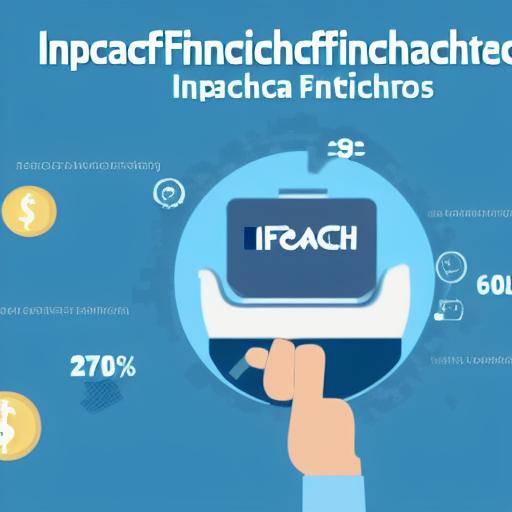
Introduction
The digital revolution has transformed the way we carry out our daily activities, and the financial sector is no exception. The arrival of financial technologies, known as Fintech, has significantly impacted financial transparency, confidence and technology. In this article, we will explore in depth how clarity, confidence and technology have been shaped by the Fintech adoption, revealing its impact on transparency and security in financial services.
History and Background
The Fintechs emerge from the need to improve financial services through the innovative use of technology. These disruptive companies have gained ground in recent decades, challenging the hegemony of traditional financial institutions. Since its inception in the 1950s, with the introduction of the first credit card, to the current expansion of cryptocurrencies and digital payment platforms, Fintech has redefined how people interact with money and financial services.
The constant technological advance has allowed the Fintech to innovate in areas that previously seemed unmovable. The introduction of artificial intelligence algorithms and big data analysis have provided powerful tools to understand and predict financial behavior, directly impacting on transparency and informed decision-making.
Analysis in Deep
The Fintechs have provided various advantages in terms of clarity and financial transparency. For example, financial management platforms offer a detailed view of income and expenditure, allowing users to have more precise control of their finances. The automation of financial processes has also reduced the possibility of human errors, increasing the reliability of transactions.
However, the implementation of financial technologies is not without challenges. Cybersecurity and data protection have become a growing concern. User confidence is compromised if the security of your financial data is not guaranteed. Perception of risk and reliability in digital transactions is a fundamental aspect that Fintech must address to maintain acceptance and adoption of its services.
Comprehensive review
The impact of the Fintechs on transparency is not limited to the consumer environment. Companies also benefit from the clarity that these technologies offer in financial management and decision-making. The ability to access real-time information and generate detailed reports has improved operational efficiency and strategic planning capacity.
For regulatory entities, the boom of the Fintech has made a challenge and, at the same time, an opportunity. The need to balance innovation with consumer protection and financial stability has led to the creation of regulatory frameworks specific to financial technologies, seeking to maintain a safe and reliable environment for all parties involved.
Comparative analysis
The relationship between clarity, trust and technology is evident in the context of the Fintech. The clarity in the financial information contributes directly to the user's confidence in the services offered, and the technology is the main facilitator to achieve it. The adoption of technologies such as blockchain, which provides an unchanging record of transactions, has revolutionized confidence in the integrity of financial data.
Practical Tips and Accessible Recommendations
In considering the adoption of Fintech solutions, it is crucial for users and companies to evaluate the transparency, security and reliability they offer. Some practical advices include comprehensive review of platform privacy and security policies, as well as verification of the reputation and background of the company concerned.
Perceptions of Industry and Expert Reviews
Experts in the financial industry agree that the Fintechs have revolutionized the transparency and reliability of financial services, while introducing new challenges. The need to balance innovation with consumer protection and the stability of the financial system has been a recurring theme among experts.
Case Studies and Applications in Real Life
Several companies have successfully implemented Fintech solutions, positively impacting their transparency, confidence and operational efficiency. An outstanding example is the use of collective funding platforms, which provide clarity in the investment process and generate confidence by connecting directly to investors and projects.
Future Trends and Predictions
The future of the financial sector is strongly influenced by the Fintech. Technology is expected to continue to enhance clarity and confidence in financial services, as innovative solutions are developed to address emerging challenges in cybersecurity and data protection.
Conclusion
The Fintechs have generated a profound impact on transparency and confidence in financial services. Technological innovation has made financial information more clear, while challenging the industry to ensure the reliability and security of its operations. The balance between innovation, transparency and trust will be fundamental in the future evolution of Fintech and its impact on financial transparency.
Frequently asked questions
1. How does Fintech affect transparency compared to traditional financial institutions?
The Fintechs have improved transparency by providing users with more direct access to their financial information and by offering more personalized and user-centred services.
2. What are the key challenges in trust in the Fintechs?
Key challenges include data protection and cybersecurity, user perception of risk, and the need for adequate regulation to ensure the reliability of operations.
3. How can companies evaluate the reliability of a Fintech platform?
It is advisable to review the privacy and security policies of the platform, as well as look for opinions from other users and study the reputation and background of the company.
4. What is the impact of artificial intelligence on financial transparency through Fintech?
Artificial intelligence has allowed to analyze large volumes of financial data to identify patterns and provide customized recommendations, which improves information clarity and informed decision-making.
5. To what extent do government regulations influence transparency and confidence in Fintech?
Government regulations play a key role in establishing standards of transparency and confidence, while ensuring consumer protection and stability in the financial system.
6. What are the main future trends in Fintech regarding financial transparency?
Fintechs are expected to continue to develop innovative solutions to improve clarity and confidence in financial services, focusing on data protection and the integration of emerging technologies such as blockchain.
With the digital revolution in full swing, the Fintechs have demonstrated their ability to transform transparency and confidence in the financial industry. As these technologies continue to evolve, their impact will remain significant, redefining how we interact with money and financial services.
Remember that Fintech's analysis is essential to better understand its effects. Put these tips into practice and make the most of this resource!






















































